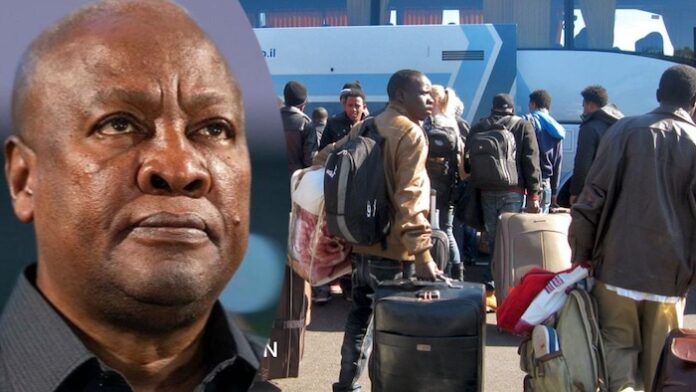Ghana has confirmed it is receiving west African nationals deported from the United States under a new arrangement that has already seen the arrival of a first group.
President John Mahama told reporters late Wednesday that Washington had approached Accra to accept third-party nationals removed from the US. He said Ghana agreed on the basis that citizens of west African states are permitted free movement across the region.
“We were approached by the US to accept third-party nationals who were being removed from the US. And we agreed with them that west African nationals were acceptable,” Mahama said.
According to him, a first batch of 14 people has arrived in Ghana, including several Nigerians who have since returned to their home country, as well as one person from The Gambia.
The announcement comes at a sensitive moment. Ghana has faced sporadic anti-Nigerian protests in recent weeks, with demonstrators in some cities demanding the expulsion of Nigerians and accusing them of crime and unfair economic competition. In July, Nigeria dispatched a special envoy to Accra, and both governments urged calm while officials held talks to ease tensions.
The deportation deal also follows economic pressure from Washington. The US has increased tariffs on Ghanaian goods and tightened visa restrictions for Ghanaian nationals. Mahama acknowledged that relations with the US were “tightening,” though he stressed they remained positive.
Neighbouring Nigeria has resisted similar requests. Foreign Minister Yusuf Tuggar told Channels Television in July that Washington was pressing African countries to accept Venezuelans deported from the US, some directly from prisons. “It will be difficult for Nigeria to accept Venezuelan prisoners,” Tuggar said, suggesting recent tariff threats were tied to the deportation issue.
Under President Donald Trump, the US has deported hundreds of third-country nationals to Panama, El Salvador, and even South Sudan. Some removals went ahead despite US judges ordering planes to turn back, as the administration invoked an 18th-century law to expel people it accused of being Venezuelan gang members.

